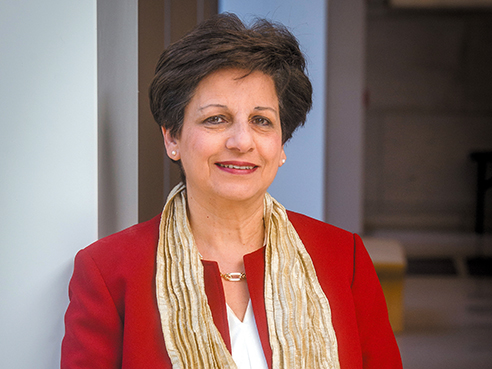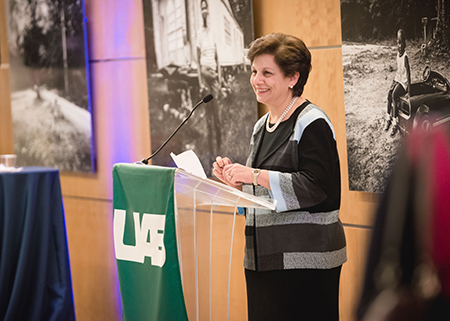 Mona Fouad, M.D., professor in and director of the Division of Preventive Medicine, founding director of UAB’s Minority Health & Health Disparities Research Center and senior associate dean for Diversity and Inclusion for the UAB School of MedicineSometimes, big transformations begin with small changes — seeing a new perspective or meeting someone different from you.
Mona Fouad, M.D., professor in and director of the Division of Preventive Medicine, founding director of UAB’s Minority Health & Health Disparities Research Center and senior associate dean for Diversity and Inclusion for the UAB School of MedicineSometimes, big transformations begin with small changes — seeing a new perspective or meeting someone different from you.
Mona Fouad, M.D., wanted to know the best way to treat and control high blood pressure in under-served populations. As a newly minted UAB researcher in the early 1990s, she was a research fellow for an investigator funded by the National Institutes of Health to study ways to reduce heart disease in Birmingham city employees. Street and sanitation workers had the highest rates of uncontrolled blood pressure in the group.
Fouad tried holding educational intervention courses in the Birmingham Public Library downtown branch, but no one showed. The sanitation team worked 10-hour shifts that began at 4 a.m., their supervisor said, and the last thing they wanted to do was to go to the library for a health class. The supervisor told Fouad the workers were reluctant to leave their worksite after a shift, but they often finished their work early and stayed at the precinct to chat and unwind at day’s end.
|
“You have to tailor your interventions and treatments by understanding their lifestyle factors and social determinants of health and make each of them appropriate to the patient’s priorities.” |
So she changed her tack. Fouad started hosting educational sessions around 3 p.m. in the break room, providing hands-on, basic lessons on the importance of regularly taking medication and the long-term effects of high blood pressure.
The results, Fouad said, were both “gratifying and satisfying.” The city employees began taking their health more seriously and were grateful for her unique approach.
When the American Heart Association created a documentary about innovative interventions in 1990, Fouad’s work to reduce blood-pressure rates with city workers was highlighted. The crew interviewed the workers.
“They said, ‘We had someone to talk to who understood our lifestyle,’” Fouad said.
The root of the problem
| “It’s beyond taking or not taking medicine. We had to get to the root of the problem.” |
That attitude — understanding lifestyle differences, social factors and personal challenges when determining medical treatment for vulnerable populations — has been the basis of her research career at UAB, which began more than two decades ago as a fellow in the Division of Preventive Medicine. She’d earned her master’s of public health degree from UAB in 1986, and her medical degree from Alexandria University in Alexandria, Egypt, in 1977. Now, Fouad is a professor in and director of the division, founding director of UAB’s Minority Health & Health Disparities Research Center and senior associate dean for Diversity and Inclusion for the UAB School of Medicine. In 2017, she was elected to the National Academy of Medicine.
Her successes at UAB earned her the invitation to deliver this year’s Distinguished Faculty Lecture, the highest honor bestowed by the Academic Health Center on a faculty member who has advanced the frontiers of science and made outstanding contributions to education, research and public service. Fouad will deliver an invitation-only lecture 6 p.m. March 18 in The Florentine Building. She also will receive a $5,000 stipend.
|
“We wanted to bring scientists together. Health disparities are not determined just by behavior; it can also be impacted by social and economic, as well as biological and environmental factors.” |
In the early 1990s when Fouad was a research instructor at UAB, Birmingham was fertile ground for her study of health disparities — a relatively new field of research and scholarship examining the difference in health care across minority and majority populations. Working with city sanitation employees opened her eyes to the realities of health disparities and the social determinants of health, Fouad says. She learned about the burden of disease in low-income individuals or groups and realized health care providers have to meet people where they are rather than expect health-disparate patients to come to them. Finally, health care providers must customize treatment regimens and recommendations based on the needs of the individual.
“You have to tailor your interventions and treatments by understanding their lifestyle factors and social determinants of health and make each of them appropriate to the patient’s priorities,” she said. “These lessons all guided my work.”
Populations without regular access to health care face a number of issues, such as deep-seated distrust of health care systems and irregular use of medication. For example, they may not take fully recommended doses to make the prescription last longer in case it doesn’t get renewed. Or they may share medications with family members who don’t have access to medication or treatment for a similar issue.
“We had to understand all the factors that determine a person’s health instead of blaming them for poor health choices,” Fouad said. “It’s beyond taking or not taking medicine. We had to get to the root of the problem.”
 Fouad (second row from bottom, second from left), pictured at Hayes K-8 School in Kingston/North Avondale, worked with community members and partners as part of the CDC-funded Birmingham REACH for Better Health, which increases opportunities for people in food deserts to have access to fresh produce and opportunities for physical activity. Exploring disparities
Fouad (second row from bottom, second from left), pictured at Hayes K-8 School in Kingston/North Avondale, worked with community members and partners as part of the CDC-funded Birmingham REACH for Better Health, which increases opportunities for people in food deserts to have access to fresh produce and opportunities for physical activity. Exploring disparities
Fouad, with funding from the Centers for Disease Control and Prevention, next created a network of volunteers in rural counties in Alabama’s Black Belt that could help local women receive mammograms. The idea for these new Community Health Advisors (CHA) was born from a study, funded by the National Cancer Institute, to improve treatment retention among patients of Jefferson County health department clinics who had abnormal Pap smear results.
“We were working with young, vulnerable, low-income women, and we wanted to understand what we could to do improve their adherence to treatment,” Fouad said. “We knew they weren’t going to come back for treatment after an abnormal Pap smear.”
Fouad said their team realized they needed to engage those young women through their peers. By forming a network of CHAs from women in the patients’ own communities, Fouad and her team were able to bring women back for treatment.
They used that success as a model for mammogram screenings in the Black Belt and a 17-percent gap in screening rates between black and white women disappeared during the course of the program, which later expanded into the Mississippi Delta and Louisiana.
|
“The impact of her research and its resulting interventions is felt in both rural and urban communities throughout my home state of Alabama, a reality that is particularly meaningful as I have seen firsthand the heartbreaking impact of disparate health outcomes.” |
This project led to another realization, Fouad says: Women who tested positive for cancer often had difficulty making their way through the often-labyrinthine treatment system. Lack of access to resources, including transportation, and less knowledge of the inner workings of health care presented insurmountable obstacles for some, she said.
Because of that, Fouad helped establish the O’Neal Comprehensive Cancer Center’s patient navigation program. The idea grew from the Community Health Advisors in Action Program (CHAAP), a pilot launched in 2006, headed by Fouad and funded by the Avon Foundation. CHAAP trained community volunteers to help women who received an abnormal breast-cancer screening or diagnosis receive appropriate care and comply with recommended treatment. CHAAP became the basis of Increasing Minority Participation in Clinical Trials (IMPaCT), a patient navigation program funded by NIH to educate minority cancer patients about clinical trials and help them enroll in and complete the trial. In the CHAAP project, more than 98 percent of low-income breast-cancer patients made it through their entire treatment, and 78 of the African-American cancer patients in IMPaCT completed their trial.
“Patient navigation has saved some women’s lives and given minority cancer patients access to state-of-the-art treatment,” Fouad said.
Forming the MHRC
Fouad and her fellow researchers studying health disparities also learned the importance of understanding co-morbidity in under-served populations. For example, a woman who is due for a mammogram might also be diabetic or obese, conditions which can increase the risk of cancer, Fouad said.
“We’d go give a talk about breast cancer, but these women had other co-morbid diseases, such as high blood pressure and diabetes,” Fouad said.
Health disparities also can be compounded by other issues, including income, education, race, ethnicity or biological and environmental factors, collectively referred to as social determinants of health. Those determinants have to be understood in context for effective interventions to be developed, Fouad said.
|
“Many faculty were working in silos. Now, they’re benefiting by working together and growing their careers.” |
She wanted to develop a solution to this complex challenge — to bring together researchers and clinicians who study relevant topics and combine their knowledge to discover new treatments and treatment methods. Together with Selwyn Vickers, M.D., now UAB Medicine senior vice president and dean of the UAB School of Medicine, and Edward Partridge, M.D., recently retired director of the UAB O’Neal Comprehensive Cancer Center, Fouad founded the UAB Minority Health & Health Disparities Research Center (MHRC) in 2002, a comprehensive research, training and community-engagement center to reduce health disparities of vulnerable populations and disadvantaged communities. Fouad still serves as its director.
“We wanted to establish a center for a more comprehensive approach — to bring other disciplines together, from the School of Medicine to the schools of Nursing and Public Health and the College of Arts and Sciences,” Fouad said. “We wanted to bring scientists together. Health disparities are not determined just by behavior; it can also be impacted by social and economic, as well as biological and environmental factors. Both a person’s DNA code and ZIP code matter.”
|
“I believe in mentoring the next generation of scientists because addressing health disparities will take more than just a few of us.” |
Since its founding, the MHRC has received more than $188 million from the NIH in health disparities-related research funding and launched a slew of programming, including training for students from minority institutions such as the Morehouse School of Medicine, Tuskegee University, Alabama A&M University, Alabama State University, Oakwood University and Stillman College.
The MRHC also sponsors a pilot program for junior faculty and postdoctoral scholars who are ready to begin research in health disparities. The center has awarded $1.2 million; for every $1 it has granted to a new researcher, $27 more has been generated in additional funding.
“We now are an established center known for health disparities research,” Fouad said. “Many faculty were working in silos. Now, they’re benefiting by working together and growing their careers.”
Throughout her career, Fouad has received tens of millions of dollars in funding and served on dozens of national and international committees, including the NIH National Advisory Council on Minority Health and Health Disparities, the American Cancer Society Mid-South Division board, the Office of the Mayor’s Healthy Birmingham Task Force and the Board of the Centre for Health and Development at Staffordshire University in Stoke-on-Trent, England. She has published more than 130 peer-reviewed manuscripts, book chapters and abstracts, delivered more than 50 conference presentations and lectures and led more than 50 research projects as principal investigator.
 Fouad was elected to the National Academy of Medicine in 2017.“Dr. Fouad is a locomotive of communal success, not only driving herself relentlessly forward, but carrying many along in an ever-growing train,” said David Allison, Ph.D., former professor and associate dean in the School of Public Health.
Fouad was elected to the National Academy of Medicine in 2017.“Dr. Fouad is a locomotive of communal success, not only driving herself relentlessly forward, but carrying many along in an ever-growing train,” said David Allison, Ph.D., former professor and associate dean in the School of Public Health.
Starting with support
Fouad says there was no shortage of scholars who helped her grow into her career. She was hired by Albert Oberman, M.D., chair of the division in 1990, and has been mentored by Catarina Kiefe, M.D., Ph.D., Partridge and Vickers. She in turn helps mentor minority students and junior faculty through MHRC training programs and other activities on campus.
“I believe in mentoring the next generation of scientists because addressing health disparities will take more than just a few of us,” Fouad said. “We have to work together.”
Regina Benjamin, M.D., U.S. Surgeon General under President Barack Obama and founder of BayouClinic, a health clinic in Bayou La Batre, Alabama, that provides free or reduced-cost clinical services, credits Fouad with UAB’s position at the forefront of health disparities research and says that she is much more than just a researcher and advocate.
|
“From scientists working in labs to medical professionals in their clinics to people in the community, everyone is needed to help combat health disparities.” |
“As a mentor, she has nurtured and supported the careers of scores of young researchers, as well as developed meaningful pipeline programs on the undergraduate and graduate levels that have empowered hundreds of young people to pursue careers in the health sciences,” she said. “The impact of her research and its resulting interventions is felt in both rural and urban communities throughout my home state of Alabama, a reality that is particularly meaningful as I have seen firsthand the heartbreaking impact of disparate health outcomes.”
In 2005, Fouad was selected by former UAB President Carol Garrison, Ph.D., as the first chair of UAB’s Commission on the Status of Women, a campuswide initiative to promote gender inclusion and equity by supporting and improving options and opportunities for women at each stage of their education and career. Under Fouad’s leadership, the CSW began conversations in 2008 about paid parental leave, enacted in 2016, and installed the first lactation room on campus in the Shelby Biomedical Research Building; now, there are more than a dozen lactation rooms on campus.
Vickers admires Fouad’s accomplishments, especially in an era in which women were still a minority in science and medicine and she was advised — despite her medical degree — to find another job.
|
"Refusing to listen to negative voices, Fouad quietly revolutionized the way we study and understand cancer, especially as it disproportionately affects minority groups.” |
“Refusing to listen to those negative voices, Fouad began to quietly revolutionize the way we study and understand cancer, especially as it disproportionately affects minority groups. Her large cohort- and community-based studies laid a foundation for ongoing research and has led to diminished deaths from this dreaded disease,” Vickers said.
Fouad believes the future of health disparities research is bright and full of collaboration, from working with engineers to understand ways the built environment and urban planning affect health to understanding how the economy can affect wellbeing.
“Health disparities research is understood as complex and multifaceted,” Fouad said. “From scientists working in labs to medical professionals in their clinics to people in the community, everyone is needed to help combat health disparities.”
